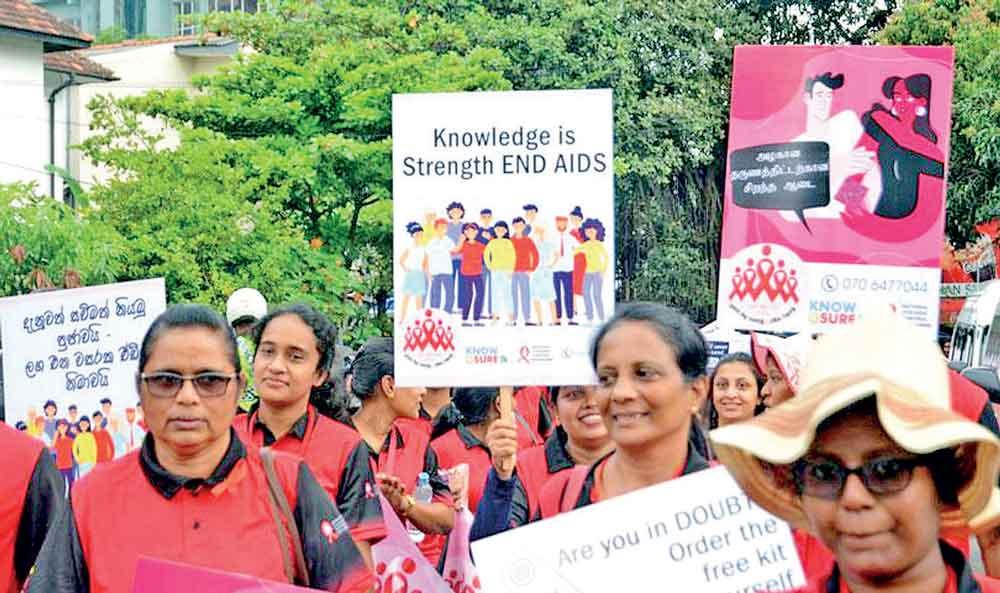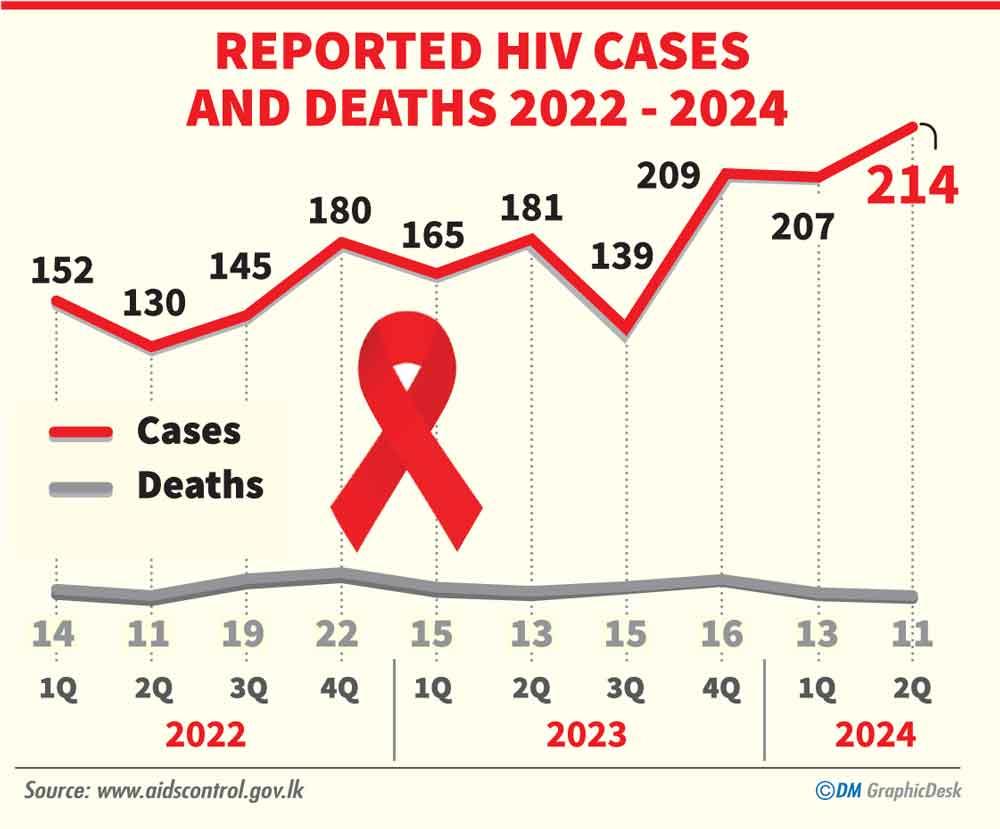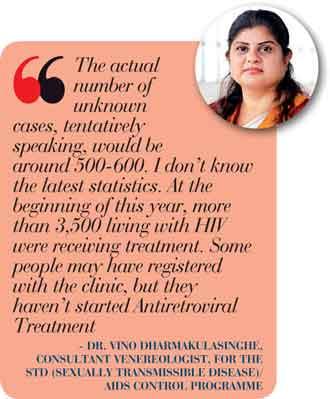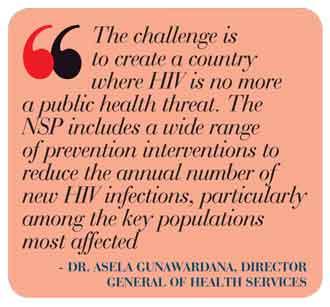10 Dec 2024 - {{hitsCtrl.values.hits}}

Awareness of Aids and treatments available to control the disease can help Sri Lanka in its efforts to end the AIDS epidemic as a public health threat by 2030
 In the backdrop of World Aid’s Day having been commemorated on December 1, medical research underscore a spike in the number of Aids cases; especially among youth.
In the backdrop of World Aid’s Day having been commemorated on December 1, medical research underscore a spike in the number of Aids cases; especially among youth.
But the fate of the unrecorded cases tends to go unspoken.
According to Dr. Vino Dharmakulasinghe, Consultant Venereologist, for the STD (Sexually Transmissible Disease)/AIDS Control Programme, there are 4,700 recorded Aids cases and based on an estimate of National STD, AIDS Control Program, the unrecorded cases would be around 500-600.
“The actual number of unknown cases, tentatively speaking, would be around 500-600. I don’t know the latest statistics. At the beginning of this year, more than 3,500 living with HIV were receiving treatment. Some people may have registered with the clinic, but they haven’t started Antiretroviral Treatment (ART) (An effective treatment for HIV). Some may not even know their HIV status; some may know their HIV status, but they defaulted on the clinic visit. Individuals may still have problems like some other complications, so they wait for a few weeks or months to start the ART,” she explained.

Reasoning and revealing as to why they don’t come forward, she said that those reasons ranges from ignorance, reluctance and the stigma associated.
“One reason is, people aren’t aware that treatment is available. Therefore, they do not know HIV is a controllable illness. It cannot be cured, but still it’s like diabetic, cholesterol, High-Bloody Pressure – hence controllable. One reason is lack of knowledge. People do not come forward and do the HIV testing. Also, HIV has a stigma associated with it. The disease is such it causes bad behaviour etc. Thus, people are reluctant to come forward and do the test,” she said.
She added, “People do not come to the STD clinics due to the stigma associated with the clinics. But the staff in our clinics, set up in government hospitals, are very friendly. The staff is trained specially to maintain the confidentiality of patients and we take lot of measures to prevent stigma and discrimination. But still, we continue to fight the issues that cause stigma”.
In a bid to face these issues, the medical authorities have introduced the website www.Know4sure.lk
This website provides facilities to patients to make appointments in one of the 40 STD clinics island wide. A service provider associated with that site, will contact the patient personally. Without any barriers or disturbances, people can freely access these services.
She claimed that a lot of people are unaware that the STD network is available around the country and so is the main National STD control programme. Dr. Dharmakulasinghe also spoke about the operating of a central STD office in De Saram place, Colombo.
Aids patients in urban areas
 She denied the talk doing the rounds that people in urban areas are unaware of treatment and facilities on offer to control Aids.
She denied the talk doing the rounds that people in urban areas are unaware of treatment and facilities on offer to control Aids.
“There are HIV-diagnosed patients living all around the country. We cannot say that urban people are more vulnerable or rural people are more vulnerable. All of them can become HIV positive at any given point. Sometimes, some people have only one sexual partner, who would be their husband or wife. Still they can become infected with HIV,” she explained.
Explaining she continued, “The other thing is awareness of Aids is lacking even in urban areas. Previous messages have penetrated much more than the latest messages. We have also been doing very effective social communication strategies like know4sure.lk. We’ve maintained social media platforms. Specially, we worked for youth-friendly social media platforms to provide reliable information, but there is lack of knowledge is STI (Sexually Transmissible Infection)/HIV services in the country”.
Last year they diagnosed 694 new HIV infections in the country and 105 (15%) of them were youth, aged between15-24. . Many youth have said that they are unaware of the preventing measures. At present, lot of preventive methods are available.
Responding in this context, her team and her message was: “We’ve developed social media platforms and the official site (www.aidscontrolgov.lk) to educate youth on how to prevent HIV
“Traditionally, we’re speaking of abstinence, be faithful to the partner, delay the sexual encounters until marriage, use correct and consistent use of condoms. In addition to these measures, now there are medicines available for pre-exposure prophylaxis. That drug prevents acquiring HIV infection into the body. We do not prescribe this for all, only for high-risk patients. Also, post-exposure prophylaxis is given within 72hours since the sexual intercourse to prevent HIV infection. We’ve now both pre- and post-prophylaxis, all new strategies, but still people don’t know these,” she elaborated.
In conclusion, Dr Dharmakulasinghe said, “Especially, youth maintain that had they known about these facilities, they would’ve opted for these preventive methods. So we believe as a National STD, the AIDS control programme, age-appropriate sex education and educating new HIV preventing measures are very important to prevent the HIV epidemic in this country”.
In the meantime, Director General of Health Services, Dr. Asela Gunawardana, commenting on Sri Lanka’s National Strategic Plan (NSP) for National HIV/STI’s report said, “The challenge is to create a country where HIV is no more a public health threat. The NSP includes a wide range of prevention interventions to reduce the annual number of new HIV infections, particularly among the key populations most affected, strengthening treatment and offering care services to achieve zero AIDS related deaths and achieving zero discrimination by the elimination of discriminatory laws and practices in health care settings and address social and legal barriers and advance human rights and gender equality”.
Dr. Gunawardena also said that Sri Lanka is committed to end the epidemic by 2030.
 “Sri Lanka has committed to ‘end the AIDS epidemic as a public health threat by 2030’ to harmonise with the 2030 agenda for achieving United Nations Sustainable Development Goals. This can be met only if the fast-track targets set by United Nations Joint Programme for HIV/AIDS are achieved: 95% of people living with HIV knowing their HIV status; 95% of people who know their status on treatment; and 95% of people on treatment with suppressed viral load thereby reducing the likelihood of spreading the infection is greatly reduced. Fast-Track also includes ambitious targets of reducing new infections, zero AIDS related deaths and zero discrimination,” said Dr. Gunawardena.
“Sri Lanka has committed to ‘end the AIDS epidemic as a public health threat by 2030’ to harmonise with the 2030 agenda for achieving United Nations Sustainable Development Goals. This can be met only if the fast-track targets set by United Nations Joint Programme for HIV/AIDS are achieved: 95% of people living with HIV knowing their HIV status; 95% of people who know their status on treatment; and 95% of people on treatment with suppressed viral load thereby reducing the likelihood of spreading the infection is greatly reduced. Fast-Track also includes ambitious targets of reducing new infections, zero AIDS related deaths and zero discrimination,” said Dr. Gunawardena.
Reflecting on their progress, he went on, “Sri Lanka has made much progress in the national response to prevent and control of STI/ HIV/AIDS in the country. A concerted effort led by the National STD/AIDS Control Programme over the last four decades in partnership with several stakeholders has helped Sri Lanka to maintain a low-level HIV epidemic since 1987, when the first HIV infection was detected in the country”.
23 Dec 2024 29 minute ago
23 Dec 2024 2 hours ago
23 Dec 2024 5 hours ago
23 Dec 2024 6 hours ago